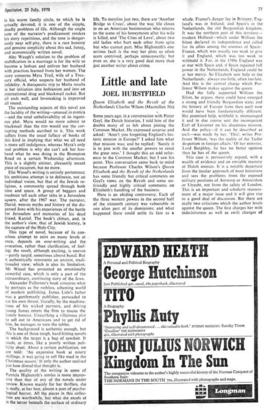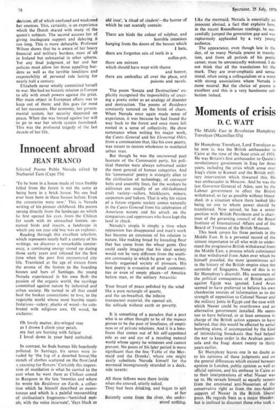Little and late
JOEL HURSTFIELD
Queen Elizabeth and the Revolt of the Netherlands Charles Wilson (Macmillan 50s) Some years ago, in a conversation with Pieter Geyl, the Dutch historian, I told him of the doubts many of us felt about joining the Common Market. He expressed surprise and asked: 'Aren't you forgetting England's his- toric mission in Europe?' I asked him what that mission was; and he replied: 'Surely it is to join with the smaller powers to resist the great ones.' I thought this an odd refer- ence to the Common Market; but I saw his point. This conversation came back to mind because Professor Charles Wilson's Queen Elizabeth and the Revolt of the Netherlands has some friendly but critical comments on Geyl's views on the Revolt and some un- friendly and highly critical comments on Elizabeth's handling of the business.
Here is an abiding controversy. Each of the three western powers in the second half of the sixteenth century was vulnerable in one alien part of its dominions; and what happened there could settle its fate as a whole. France's danger lay in Brittany; Eng- land's was in Ireland; and Spain's in the Netherlands, the old Burgundian kingdom. It was the northern part of this territory— modern Holland—which under William the Silent declared its independence and called for its allies among the enemies of Spain: France, which was usually too weak to give it and England, which was too weak to withhold it. For, in the 1580s England was at war with Spain and, if Spain regained full power in the Netherlands, England could be at her mercy. So Elizabeth sent help to the Netherlands: always too little, often too late. And this is the central charge which Pro- fessor Wilson makes against the queen.
Had she fully supported William the Silent, he argues, there could have emerged a strong and friendly Burgundian state; and the history of Europe from then until now would have been fundamentally different. She promised help, withheld it, mismanaged it and in due course sent the incompetent Earl of Leicester on his disastrous mission. And the policy—if it can be described as such—was made by her. 'This', writes Pro- fessor Wilson, 'was the reality of the Tudor despotism in foreign affairs.' Of her minister, Lord Burghley, he has no better opinion than he has of the queen.
This case is persuasively argued, with a wealth of evidence and an enviable mastery of Dutch sources. It is a notable departure from the insular approach of most historians and sees the problems from the exposed military positions of Antwerp or Amsterdam or Utrecht, not from the safety of London. This is an important and scholarly reassess- ment of a major issue and it will give rise to a good deal of discussion. But there are really two criticisms which the author levels against the queen. The first charges her with indecisiveness as well as swift changes of decision, all of which confused and weakened her enemies. This, certainly, is an experience which the Dutch shared with many of the queen's subjects. The second accuses her of giving inadequate support and delaying it too long. This is more debatable. Professor Wilson shows that he is aware of her heavy financial and military burdens, most of "all in Ireland but substantial in other spheres. Yet any final judgment, of her and her policies must allow for those appalling bur- dens as well as the terrible loneliness and responsibility of personal rule lasting for nearly half a century. Elizabeth never wholly committed herself to war. She had no historic mission in Europe to ally with small powers against the great. Her main object in European affairs was to keep out of them; and this goes for most of her successors. Her economy, her govern- mental system, her security depended on peace. When she was forced against her will to go to war her whole system foundered. This was the profound tragedy of the last decade of her life.































 Previous page
Previous page